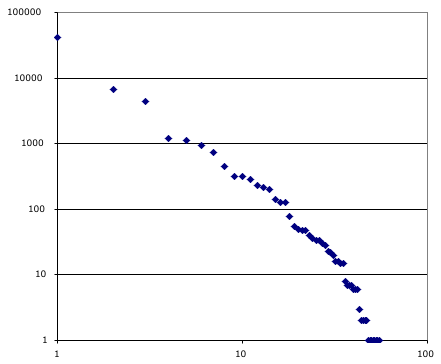 This is a note about how to save a few hundred dollars on your Verizon cellphone bill, and why you should seriously consider switching from a BSD or old Apache style license to the new cooler Apache 2.0 license.
This is a note about how to save a few hundred dollars on your Verizon cellphone bill, and why you should seriously consider switching from a BSD or old Apache style license to the new cooler Apache 2.0 license.
Standards reduce the diversity of behavior. Reducing that diversity creates efficiencies and free up resources for other activities, other kinds of diversity. In some cases the efficiencies are huge, as in the example standard of driving on the right. In other cases the efficiencies are subtle, as in knowing somebody is in your tribe and can be trusted to share a stake in the tribe’s commons.
To get a feel for how diverse a range of behaviors appears in the real world it helps if you can get a statistical distribution. For example I’d love to know the distribution over various forms of greetings: the quaker handshakes, namaste, high-five, etc.
Generally these distributions are power-law. The chart on the right shows the distribution of various open source licenses. It’s pulled from an earlier posting.
When a new kind of behavior appears on the scene you get a lot of diversity. People experiment with assorted approaches. Different people care about different things. Some people want a very short license. Some people want credit for their work. Some folks are concerned about protecting the commons. Other people want to encourage adoption. People revise sentences to make them more readable. Lawyers practice their craft, inserting proven boiler plate or look out for whatever they happen to think is in their their clients’ best interests.
These processes generate a lot of diversity, a lot of bogosity, and some innovation. Clearly the entire idea of an open source license was a huge innovation. The discovery that the license could protect the commons was huge. That licenses effect how your code creates and taps network externalities is still not fully understood and even less fully appreciated.
There is a lot of mimicry and random mutation. For example the Apache Group mimicked the license on BSD. A lot of people mimicked the Apache license. Some of those mimics just change the name of who held the copyright, but a lot of them added, removed, or rewrote clauses for various reasons.
This early stage, the bloom of diversity, is followed by a period of consolation. At one level that’s kind of sad. Some cool innovations die out, for example some of the rewrites that made the license more readable don’t survive. Some of the innovations fall by the way because they aren’t tied to the wagon of one of the big winners.
Some of it is good, very good. Craft knowledge accumulates. Interoperablity is enabled, Resources aggregate around the winners. The good ideas are aggregated. The newer Apache license is a perfect example of this process at work. The new license maybe a lot longer, which sad, but it’s a lot more robust. It solves a number of important problems. Problems that really need to be addressing. For example it is a lot more careful about protecting the code from malicious infection by contributor IP rights. It also solves some perfectly silly problems, like how to avoiding having to put your entire license at the top of every source file.
It’s interesting how the revision of licenses is exactly like the problem of upgrading an installed base of software. All those licenses that mimic the older Apache license are like an installed base. It’s very hard to get them to upgrade. The classic metaphor for upgrading an installed base is: Build them a golden bridge, and then set a fire behind them. I doubt anybody can implement that plan in the open source licensing world. I suspect people will try. But that metaphor is an interesting example of how a seemingly minor detail in the license in one time frame can become extremely valuable in a later time frame. It’s one reason that many agreements between a firm and a consumer typically contain a clause that allows the vendor to casually change them later. I gather that Verizon recently changed their cell phone contract and one fall out is that the subscribers can bail without paying the early termination charges.
It is clear to me, that people in the Apache or BSD licensing community would be well served by upgrading their licenses to the new Apache license. Just to be clear that doesn’t imply assigning copyright to the foundation. The new license is just plain better than the old one.
Yes, we must all upgrade to licenses that protect us from the evil “big blue” power. Notice your dots are blue, of course I’m color blind so…